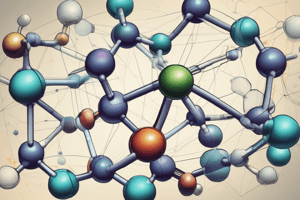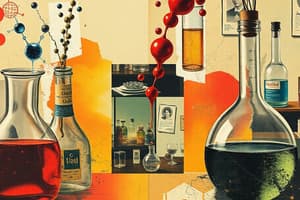Podcast
Questions and Answers
What is an element according to the text?
What is an element according to the text?
- A mixture of different kinds of atoms
- A compound made of multiple elements
- A pure substance made of only one type of atom (correct)
- A substance that can be broken down into other substances
Why is water not considered an element?
Why is water not considered an element?
- Because water is a mixture of different kinds of atoms
- Because water can be broken down into other substances (correct)
- Because water is a compound made of multiple elements
- Because water is a pure substance made of only one type of atom
How are elements different from each other?
How are elements different from each other?
- By the properties of the atoms they are made of (correct)
- By their ability to mix with other types of atoms
- By the number of subatomic particles within each atom
- By the way they combine to form molecules
Why are elements compared to letters combining to form words in the text?
Why are elements compared to letters combining to form words in the text?
What differentiates chemicals from elements?
What differentiates chemicals from elements?
What are atoms made of according to the text?
What are atoms made of according to the text?
How is an atom typically structured?
How is an atom typically structured?
What are the 3 main components found in an atom's nucleus?
What are the 3 main components found in an atom's nucleus?
Which element has 2 protons, 2 electrons, and 2 neutrons?
Which element has 2 protons, 2 electrons, and 2 neutrons?
What determines the reactivity of an element and many of its properties?
What determines the reactivity of an element and many of its properties?
What is the lightest and most abundant element in the universe?
What is the lightest and most abundant element in the universe?
Why are hydrogen and helium, despite similar protons and electrons, different in stability?
Why are hydrogen and helium, despite similar protons and electrons, different in stability?
Which category of elements on the Periodic Table are typically solid at room temperature and good conductors of electricity?
Which category of elements on the Periodic Table are typically solid at room temperature and good conductors of electricity?
Why are non-metal elements described as dull and brittle?
Why are non-metal elements described as dull and brittle?
Why is water not considered an element?
Why is water not considered an element?
How are elements different from chemicals according to the text?
How are elements different from chemicals according to the text?
What do elements combine to form, according to the text?
What do elements combine to form, according to the text?
What do atoms consist of, based on the text?
What do atoms consist of, based on the text?
Why are elements compared to letters combining to form words in the text?
Why are elements compared to letters combining to form words in the text?
What determines if something is considered matter according to the text?
What determines if something is considered matter according to the text?
Why are elements described as pure substances according to the text?
Why are elements described as pure substances according to the text?
What is the location of protons and neutrons in an atom?
What is the location of protons and neutrons in an atom?
Which element is described as typically a solid and highly reactive?
Which element is described as typically a solid and highly reactive?
Why are hydrogen and helium mentioned as different despite their similar proton and electron numbers?
Why are hydrogen and helium mentioned as different despite their similar proton and electron numbers?
What determines the reactivity of an element and many of its properties?
What determines the reactivity of an element and many of its properties?
Why are non-metal elements described as poor conductors of heat and electricity?
Why are non-metal elements described as poor conductors of heat and electricity?
What makes each element unique?
What makes each element unique?
How many natural elements are known to scientists?
How many natural elements are known to scientists?
Flashcards are hidden until you start studying




